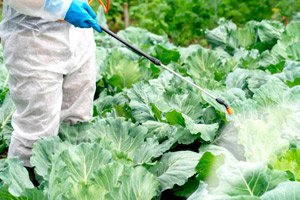
All iLive content is medically reviewed or fact checked to ensure as much factual accuracy as possible.
We have strict sourcing guidelines and only link to reputable media sites, academic research institutions and, whenever possible, medically peer reviewed studies. Note that the numbers in parentheses ([1], [2], etc.) are clickable links to these studies.
If you feel that any of our content is inaccurate, out-of-date, or otherwise questionable, please select it and press Ctrl + Enter.
Pesticides in agriculture may pose the same cancer risk as smoking
Last reviewed: 02.07.2025
 ">
">In modern agriculture, pesticides are essential to ensure high yields and food security. However, these chemicals can have negative effects on plant and animal life, as well as on people exposed to them.
Now, in a population-based national study, US researchers have compared the increased cancer risk from agricultural pesticide use with smoking, a better-studied cancer risk factor. The results were published in the journal Frontiers in Cancer Control and Society.
Contextualizing cancer risk
"In our study, we found that for some cancers, the effect of agricultural pesticide use is comparable in magnitude to the effect of smoking," said Dr. Isain Zapata, lead author of the study and an associate professor at Rocky Vista University College of Osteopathic Medicine in Colorado.
Research results
"We take into account that a non-farmer living in a community with intensive agricultural production is exposed to many of the pesticides used in their surroundings. It becomes part of their environment," Zapata said.
The researchers found that in this environment, the impact of pesticide use on cancer incidence was comparable to that of smoking. The strongest associations were seen with non-Hodgkin lymphoma, leukemia, and bladder cancer. In these cancers, the effects of pesticide exposure were greater than those of smoking.
"We present a list of the main pesticides that contribute to some specific cancers, but we emphasize that it is a combination of all of them, not just one," Zapata said.
Pesticide Cocktails
Because pesticides aren't used alone, the researchers think it's unlikely that any one is the sole cause. While some pesticides are discussed more than others, all of them — and often a combination of them — can have an effect. Accordingly, the researchers included 69 pesticides for which use data is available through the U.S. Geological Survey. "In real life, it's unlikely that people are exposed to a single pesticide, but rather to a cocktail of pesticides in their area," Zapata said.
Looking at the Big Picture
The researchers say that while their study adds to our understanding of pesticide use in the U.S., cancer risk factors are complex, and looking at the overall picture may not reflect individual outcomes. For example, geography has a strong influence. In regions where more crops are grown, such as the Midwest, famous for its corn fields, the associations between pesticides and cancer were stronger.
Researchers' goals
One of the researchers' goals is to raise awareness among people, even those who are not frequently exposed to pesticides, about the problems associated with their use.
"Every time I go to the supermarket to buy food, I think about the farmer who was part of the process of creating that product. These people often put themselves at risk for my convenience, and that plays a role in how I feel about that product. It's definitely affected how I feel when a forgotten tomato in the refrigerator goes bad and has to be thrown out," Zapata said.
